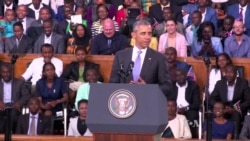President Barack Obama has arrived in Ethiopia for two days of talks focused on terrorism, human rights and the civil war in South Sudan.
The president was welcomed Sunday at the Addis Ababa airport by Ethiopian Prime Minister Hailemariam Desalegn and then taken to the U.S. Embassy for a meeting with embassy staff.
Monday, Obama is scheduled to hold bilateral talks with Ethiopian leaders and convene a meeting of East African heads of state to discuss the South Sudan conflict.
Before Ethiopia, Obama spent two days in his father's homeland of Kenya, where he was hailed as a native son.
In a speech Sunday to 4,000 students at Nairobi's Safaricom Stadium — where he was introduced by his Kenyan half sister, Auma Obama — the president said Kenya was at a crossroads "filled with peril, but also with enormous promise."
Obama thanked Kenyan President Uhuru Kenyatta for his hospitality during the visit and said he was proud "to be the first American president to come to Kenya, and of course I am the first Kenyan-American to be president of the United States.”
'A better history'
The president praised the progress Kenya has made since winning independence from British colonial rule in 1963, including the end of one-party rule and the overcoming of deadly tribal and ethnic violence that broke out in 2007 and plagued the country for several months.
"The people of Kenya chose not to be defined by the hatreds of the past," Obama said. "You chose a better history."
But continued progress, Obama said, must be built on a society free of corruption, respect for opposing voices and unity.
“I want to be very clear here: A politics that is based solely on tribe and ethnicity is a politics that is doomed to tear a country apart. It is a failure — a failure of imagination,” he said.
Obama said Kenya must build on three crucial pillars: strong and transparent democratic governance, universal economic development, and a strong sense of national identity that "rejects conflict for a future of peace and reconciliation."
He also said that too often in Kenya, corruption is tolerated because that’s how things have been done, and that it's time to change that habit.
He urged the country to increase efforts to root out official corruption, saying "every shilling that's paid as a bribe could be put in the pocket of someone that's doing an honest day's work."
Call for women's rights
Obama drew more cheers and applause when he spoke passionately against traditions that repress women and girls.
"Kenya will not succeed if it treats girls and women as second-class citizens," he said.
He called for an end to the practices of forced marriages, genital mutilation and prohibition of education for girls. "These traditions may date back centuries. They have no place in the 21st century," the president said.
Drawing a comparison to the Confederate flag debate in the U.S., he said just because something is a tradition doesn't make it right.
Obama's call to educate girls and employ women resonated with Daystar University student Emmy Gachini.
“It made me feel amazing, because as a woman, that is what I want to hear," she said. "Because maybe one day, I want to be in politics, and because of the rules and stereotypes that we have in Africa, we cannot be able to get these seats [in parliament.]”
"Incredible" and "motivating" were words Grace Kariiru, 21, used to describe Obama’s speech.
“We are also people who can do big things, and the fact that he is president of America makes us very proud and very motivated,” she said.
Ethiopia next on itinerary
On Tuesday, Obama is due to make the first visit by a U.S. president to the headquarters of the African Union.
Human-rights concerns loom large in the background of Obama's travels in Africa. Before he left the United States, human rights groups urged him to call for fundamental rights reforms in both Kenya and Ethiopia.
In a letter to Obama, a group of 14 nongovernmental organizations and individual experts said the Kenyan and Ethiopian governments "face real security threats, but we are concerned by the way in which each government has responded, often with abusive security measures and increased efforts to stifle civil society and independent media.”
Ben Rhodes, the president's national security spokesman, said Obama would raise human rights issues in Ethiopia, just as he did in Kenya. During a press conference Saturday with Kenyatta, Obama said he believes the state should not discriminate against people based on their sexual orientation.
WATCH: VOA's Anita Powell previews President Obama's Ethiopia visit:
Obama ended a busy day in Nairobi on Saturday at a state dinner hosted by Kenyatta.
Obama noted that his Kenyan-born father and Kenyatta's father knew each other.
"It would have been hard for them to imagine how their sons might be sitting here today," he said.
He also joked that "some of my critics back home are suggesting that I'm back here to look for my birth certificate," a reference to accusations that he is not a U.S.-born citizen, which would make him constitutionally ineligible for the presidency.
Kenyatta, the son of Kenya's first president, Joma Kenyatta, hailed the initiative begun in the late 1950s that allowed hundreds of Kenyan college students, including Obama's father, to study in the United States.
WATCH: Gabe Joselow reports on Obama's first day in Kenya:
Earlier Saturday, Obama addressed the Global Entrepreneurship Summit, being held in Africa for the first time. He said entrepreneurship in Africa helps break down barriers and build bridges between cultures, providing an alternative to violence and hopelessness.
"Africa is on the move," he said, and "Kenya is leading the way."
In his remarks, Kenyatta spoke of Kenya's security struggles and its swiftly growing economy. He told his audience of entrepreneurs and investors from around the world to tell friends everywhere that "Africa is open and ready for business."
On Friday night, the president had dinner at his hotel with his Kenyan relatives, including his step-grandmother, Mama Sarah, and his half sister. U.S. officials said security concerns ruled out a presidential trip to the west Kenyan village of Kogelo, where his father was born and is buried.
VOA's Gabe Joselow, Anita Powell, Arash Arabasadi and Vincent Makori contributed to this story.







